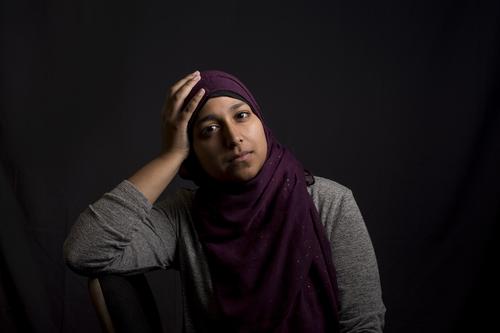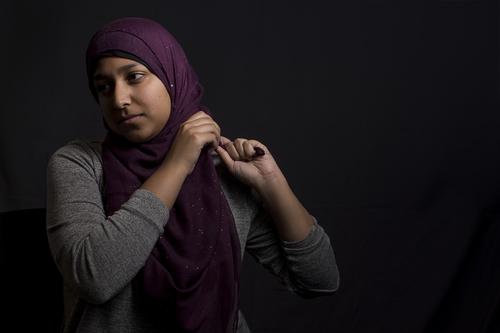

I walked back from class, my hair damp with sweat beneath the fabric covering my head.
A group of students scattered across Bruin Walk handed out flyers and stopped each person that passed by to passionately discuss their civil rights campaign.
“Support marriage equality!”
As I walked by, every single one of them avoided making eye contact with me.
On one hand, I was glad to be left alone because being approached by strangers makes me uncomfortable. At the same time, I was upset. Given how enthusiastic the people flyering were, their avoidance of me felt like an assumption, based on my appearance, that I would never support marriage equality.
I wear a hijab.
Colloquially, “hijab” is used to refer to the headscarf many Muslim women wear. On a more technical level, “hijab” refers to Islamic standards for dress and behavior, which emphasize modesty and dignity. I choose to cover my hair because I believe it is one part of this larger set of standards. Sometimes when people look at me, all they see is my headscarf. To them, I am not a UCLA student; I am not a feminist; I am not an editor at the Daily Bruin – my identity is reduced to what they surmise from a piece of fabric on my head.
These are the same people who stop me to ask my opinion on the Israeli-Palestinian conflict, to ask me what makes Islam better than Christianity, to start up religious debates with me.
Don’t get me wrong – I am happy to answer questions about why I personally decided to cover my hair and what it means to me. In fact, I also enjoy discussing a myriad of topics unrelated to religion. But when I’m suddenly expected to explain and defend my beliefs while I’m going about a normal day on campus stressing about midterms, I get a little frustrated.
The fact of the matter is that I am not an authority on Islam, nor do I know much about religious politics. My open display of faith is by no means a declaration of expertise on the subject.
I leaned into the conversation, absentmindedly tucking back a strand of hair that had escaped my headscarf as my friend told me about her relationship with her faith.
She told me about how she believed in Christianity as a religion but followed the teachings of Buddhism in her day-to-day behavior. Since I regard Islam as both my religion and my guidebook for daily life, we compared the teachings of Christianity, Buddhism and Islam, finding several similarities among the three faiths.

Sometimes the subject of religion will come up while I’m casually speaking with my friends. I enjoy learning about other people’s religious beliefs. It is interesting to hear what others – whether they are Jewish, Hindu, atheist or anything else – think of spirituality.
What I do not enjoy is how some people seem to close up while talking to me about their faith, as if I will somehow look down upon their practices simply because I am so obviously spiritual.
A Muslim friend once came to me for advice. She was having trouble completing her five daily prayers and was wondering if I had any suggestions to get her back on track. While telling me her feelings about the matter, she kept interrupting herself with phrases such as, “I’m sure you always pray on time,” and, “Please don’t think badly of me for this.”
I was flattered she trusted me with such a personal matter, but I was also saddened by how embarrassed she felt while telling me her story. Contrary to what she thought, my ability to give her advice on the subject came not from my supposed religious authority but from my prior struggles with the very same thing.
She had nothing to be embarrassed about in front of me. Although I wear a headscarf and she does not, I did not feel religiously superior to her in any way. I knew that, although she was having trouble praying, she showed her religious devotion in other ways. They just were not as visual as my headscarf is.
Nobody ever asks me about how strong my faith is. They look at my hijab and think that somebody who is willing to put her faith on display like that must be religious.
I wonder if anybody has ever considered that maybe I am struggling with my faith. Maybe there are things about faith that confuse and elude me. Maybe I could occasionally use their religious advice rather than the other way around.
Because sometimes I am confused, and sometimes I do struggle with my faith.
The barista took my order, glancing away as I adjusted my scarf.
I am not normally a self-conscious person. I do not usually spend time thinking about what others think of me, what they think of my headscarf. But sometimes I cannot help but think about what the woman in the elevator sees when she glances at me and quickly looks away throughout our brief trip together, or what that parent thinks as he hurriedly pulls his child away from the good-natured staring contest we started at the grocery store. I cannot help but notice the car that was idling in the Luskin Conference Center turnaround speed up to pass me and then slow down to ask the person three feet in front of me for directions to Pauley Pavilion.
Then I start to wonder if my behavior seems too aggressive. I have never been very bubbly or friendly around strangers, but I start to wonder if I should change that. Should I have smiled more when I ordered my chai latte? Could my walk somehow be calmer?
Most of the time when I start thinking these thoughts, I am quick to laugh at my foolishness. Why am I thinking about whether my walk is too aggressive? It is ridiculous to think that I should make myself less assertive because of how I dress.
However, there are times I cannot shake these thoughts so easily, because I know there are people out there who consider my every action to be offensive simply because I wear a piece of fabric around my head.
California is so diverse that it is easy to forget how foreign the sight of a woman in a headscarf is in certain parts of the United States. I once visited a smaller city in the Midwest for a wedding, and I will never forget the reaction I received as I stepped off the plane and into the airport. I was simply walking toward baggage claim, but silence and stares followed in my wake.
I could stop nearly all discussion and movement in an airport terminal with my presence. The United States is the only home I have ever known, but in that moment I had never felt more like I did not belong.
I had never felt more powerful, and I had never felt more powerless.
For me, wearing a headscarf can be a heavy burden to bear, but not for reasons people usually assume.
I have Muslim friends who simply cannot bear the thought of covering their hair. They think it makes them look ugly and cannot get past that. I have Muslim friends who are afraid they will be attacked or discriminated against if they wear a headscarf.
While I can appreciate these concerns, they have never been issues I spent much time worrying about, and I do not think of them as the true burden of hijab.
For me, covering my hair can be difficult because it puts me up on a pedestal I do not want. It seems to imply some sort of moral superiority or religious authority I do not have. I am simply trying to practice my faith in the way I know how.
In my eyes, donning a headscarf every morning is a commitment I am making to myself to continually strive to better my character. It is a reminder of who I am and what I believe, a reminder to uphold my dignity and self-respect in all my actions.
Yes, hijab can be a burden, but over the past six years, it has become an integral part of my identity. Not wearing it would feel stranger than wearing it.
I used to wonder how my life would be different if I had never started covering my hair. Would I care more about my appearance? Would I be more outgoing? Would I have more friends?
This is where I often stopped myself.
I reasoned to myself that if someone were not my friend because of my hijab, they probably were not a friend I needed anyway. I have made many friends through my headscarf, either because they knew what it meant or because they did not and wished they did.
Looking back, I must have spent hours thinking about how my life might be different, never reaching a definitive answer because it simply is not possible to determine all the ways hijab has affected my life.
But who knows? It is not something I waste time thinking about anymore.
Because an Umbreen who wears a headscarf is a truer version of myself than an Umbreen who does not wear a headscarf. And I cannot be apologetic about that.